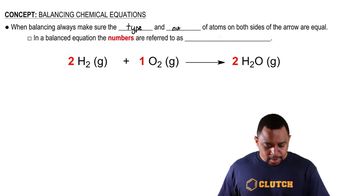Acetone, CH3COCH3, is a nonelectrolyte; hypochlorous acid, HClO, is a weak electrolyte; and ammonium chloride, NH4Cl, is a strong electrolyte. (b) If 0.1 mol of each compound is dissolved in solution, which one contains 0.2 mol of solute particles, which contains 0.1 mol of solute particles, and which contains somewhere between 0.1 and 0.2 mol of solute particles?
Ch.4 - Reactions in Aqueous Solution
Chapter 4, Problem 23c
Will precipitation occur when the following solutions are mixed? If so, write a balanced chemical equation for the reaction. c. FeSO4 and Pb(NO3)2
 Verified step by step guidance
Verified step by step guidance1
Determine the possible products of the reaction by swapping the anions and cations of the reactants: FeSO4 and Pb(NO3)2 can form Fe(NO3)2 and PbSO4.
Consult the solubility rules to determine if any of the products are insoluble in water. PbSO4 is generally insoluble, while Fe(NO3)2 is soluble.
Since PbSO4 is insoluble, it will precipitate out of the solution, indicating that a precipitation reaction occurs.
Write the balanced chemical equation for the reaction: FeSO4(aq) + Pb(NO3)2(aq) -> Fe(NO3)2(aq) + PbSO4(s).
Verify that the equation is balanced by ensuring the same number of each type of atom appears on both sides of the equation.

Verified Solution
Video duration:
2mWas this helpful?
Key Concepts
Here are the essential concepts you must grasp in order to answer the question correctly.
Solubility Rules
Solubility rules are guidelines that help predict whether a compound will dissolve in water. For example, most sulfates are soluble, but barium sulfate and lead(II) sulfate are exceptions. Understanding these rules is crucial for determining if a precipitation reaction will occur when two solutions are mixed.
Recommended video:
Guided course

Solubility Rules
Precipitation Reactions
A precipitation reaction occurs when two soluble salts react in solution to form an insoluble product, known as a precipitate. This process can be represented by a balanced chemical equation, which shows the reactants and the products formed. Identifying the precipitate is essential for answering the question about whether precipitation will occur.
Recommended video:
Guided course

Selective Precipitation
Balanced Chemical Equations
A balanced chemical equation represents a chemical reaction with equal numbers of each type of atom on both sides of the equation. Balancing ensures the law of conservation of mass is upheld. In the context of precipitation reactions, writing a balanced equation helps illustrate the reactants and the precipitate formed, providing clarity on the reaction process.
Recommended video:
Guided course

Balancing Chemical Equations
Related Practice
Textbook Question
1332
views
1
rank
Textbook Question
Using solubility guidelines, predict whether each of the following compounds is soluble or insoluble in water: (a) MgBr2
1363
views
Textbook Question
Predict whether each of the following compounds is soluble in water: d. Al(OH)3
1
views
Textbook Question
Identify the precipitate (if any) that forms when the following solutions are mixed, and write a balanced equation for each reaction. b. KOH and Cu(NO3)2
3
views
Textbook Question
Which ions remain in solution, unreacted, after each of the following pairs of solutions is mixed? (a) potassium carbonate and magnesium sulfate
646
views
Textbook Question
Which ions remain in solution, unreacted, after each of the following pairs of solutions is mixed? (c) ammonium phosphate and calcium chloride
903
views
